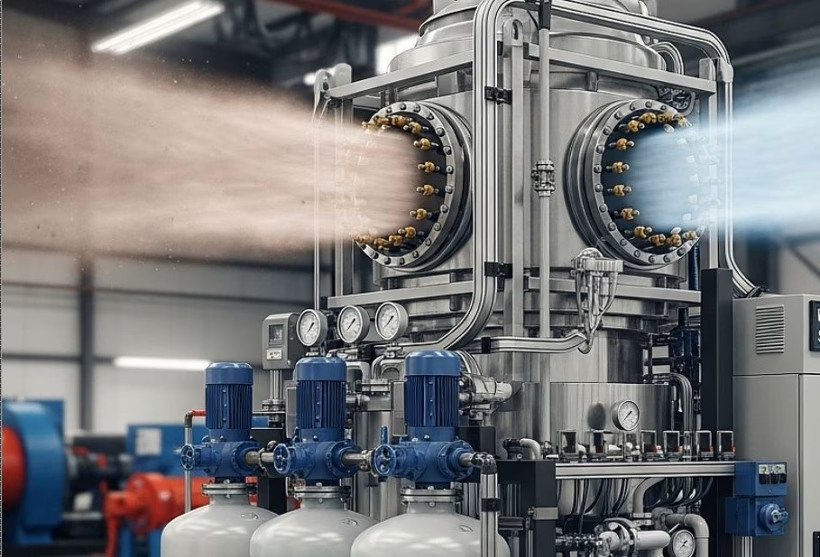Airborne dust problems are usually a serious challenge at industrial sites. Fine particulate matter could be emitted through construction work, the movement of materials, and the movement of vehicles and this affects the workers and the communities around them. Health concerns, which may include breathing problems and eye irritation, may be caused by poor quality of air, and equipment wear and environmental pollution may also take place. It is hence important to find proper ways of taming dust in order to have a healthy and efficient industrial environment.
Dust management has surfaced as a good solution to be in the hands of magnesium chloride. It is very successful in the elimination of airborne particles because it attracts and retains moisture. Magnesium chloride, as opposed to other types of chemical treatments, is a slow acting compound, producing a more durable shield against dust. This renders it especially important in locations where standard sprays of water need to be applied too often, and do so inefficiently and at a high price.
Dust Suppression Mechanism
Magnesium chloride enhances the air quality by the virtue of its hygroscopic properties. When sprayed on surfaces, it absorbs moisture in the air such that dust particles are rendered damp, and thus they cannot get airborne. This is particularly necessary especially in dry or windy weather conditions where dust is known to spread easily around an industrial facility. This controlled amount of moisture will help in keeping the concentration of the particulate matter in the air low thus enhancing visibility and safety.
Suppression of dust using magnesium chloride is boosted in cases where liquid magnesium chloride is used. This shape is also capable of even distribution when covering big spaces, and the moisture is held constantly. Liquid magnesium chloride also penetrates deeper into the surface layers than the dry granules and forms a protective layer that holds the dust particles together. In the long run, this will decrease cases of airborne dust occurrences which will lead to a cleaner and healthier work environment.
Environmental and Safety Advantages
The magnesium chloride dust control is environmentally friendly as opposed to other chemical dust control agents. It is further not as corrosive as other products like calcium chloride and thus has less chances of damaging equipment, infrastructure and soil. The magnesium chloride is also beneficial in maintaining the quantity of particulate matter emitted to the immediate environments as it does not allow dust to be suspended in the air hence conserving the quality of water and soil.
On the safety aspect, the quality of the air is improved, which reduces the respiratory risks to the employee in the factory. Consumption of a constant decrease of the dust level means that employees do not expose themselves to fine dust materials as much as to cause chronic diseases. In addition, it improves the visibility on-site by reducing the airborne dust, and the risk of accidents caused by poor vision is minimized. All these health and safety benefits add up to the fact that magnesium chloride is a useful dust management tool, which is used in industries.
Application Techniques and Considerations
Magnesium chloride dust control can be most optimized by proper application of the same. The surface should be covered evenly and the solution should be spread at the optimal concentration to get the best moisture retention. In other instances, magnesium chloride can be used with a salt brine for roads, particularly in locations where there is vehicle activity as this can be used to stabilize the road and avoid additional dust scattered into the air.
Successful dust suppression also includes monitoring and maintenance. The efficacy of magnesium chloride treatments can be decreased with time owing to rainfall, wind, and traffic. The schedules of reapplication must rely on the conditions and the environmental factors in the site to ensure consistency in the improvement of the air quality. Through these practices, industrial sites will be able to have long term benefits of dust control and reduce costs and resource consumption.
Industrial Site Long Term Benefits
Magnesium chloride use helps in the improvement of the air and site management in the long run. The decreased dust levels not only minimize workers but also machinery and infrastructure, minimize the cost of maintenance and replacement of infrastructure. Better air also facilitates adherence to environmental codes and occupational health and safety standards, which augurs well with the image of industrial operations.
In general, magnesium chloride is a viable and sustainable technology to enhance the quality of air in industries. Its moisture retention, lessening of particulate matter, and worker health-supporting attributes make it a good option in preference by companies looking at effective dust prevention methods. Magnesium chloride has the potential to be used to make the industrial environment safer, cleaner and more efficient with proper application and maintenance.
Read Next:








